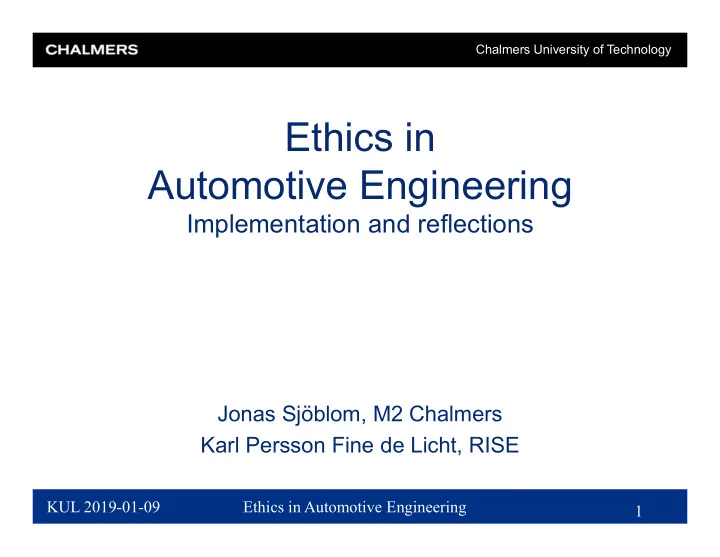

Chalmers University of Technology Ethics in Automotive Engineering Implementation and reflections Jonas Sjöblom, M2 Chalmers Karl Persson Fine de Licht, RISE KUL 2019-01-09 Ethics in Automotive Engineering 1
Chalmers University of Technology Outline • Background • Ethics exercise in MTF240 (Internal Combustion Engines) • Results & Reflections • Discussions KUL 2019-01-09 Ethics in Automotive Engineering 2
Chalmers University of Technology Background – the Automotive perspective – The role of the internal combustion engine (ICE) • Enabler of transportation and societal growth • Impact on the environment and human health (globally and locally) – Students from Masters Programme Automotive Engineering (MPAUT) • Will work in a world of change • In a society with increase in ethical conflicts/dilemmas KUL 2019-01-09 Ethics in Automotive Engineering 3
Chalmers University of Technology Ethics exercise in MTF240 – Ethics in Masters programme Automotive Engineering (MPAUT) • In many MPAUT courses (~75%, 2016) • MTF240 (Internal Combustion Engines) – Lab exercise demonstrating engine calibration – Performed twice (SP1 2017, 2018) – Learning objective: “reflect on the role of internal combustion engines for transports in society as well as the emissions issue.” – Teaching and Learning Activities • Lecture & personal reflection (concept map) • Ethical reflection “recipe” (from Karl Persson de Fine Licht) • “One-page assignment” KUL 2019-01-09 Ethics in Automotive Engineering 4
Chalmers University of Technology Lecture topics • Any transportation need energy – Fossil / renewable • Emission are global and/or local – From vehicle or during “production” – Can be “zero” (both global and local) • Powertrain design (hybridisation) depends on the objective – Heavy duty / light duty, “range anxiety” • Different incentives – Legislation, price/tax, environmental attitude • Automotive engineers will work within these areas! concept map from 2018-09-24 KUL 2019-01-09 Ethics in Automotive Engineering 5
Chalmers University of Technology “One-page assignment” • Choose one of three “cases” (“inspired” from diesel gate) – Connected to engine calibration (where basics are taught in the course and demonstrated during the lab) – Engineering trade-offs with an “ethical twist” • Hand in of PM – Work in pairs – Automatically checked for plagiarism KUL 2019-01-09 Ethics in Automotive Engineering 6
Chalmers University of Technology Example “case 1” – 2019 (VW-owner) Martin works as an engineer at car manufacturer company in Sweden. In 2014, he bought a diesel car, VW Passat and he has been very satisfied with this vehicle. It is very quick during acceleration and it has a fuel consumption that is much closer to the listed value compared to many other brands. During the autumn 2015, the “diesel gate” exploded and now Volkswagen send out invitations for exchange of the engine software . Volkswagen claims that there will be no loss in performance. However, since Martin took the course in ICE during his Masters, he remembered that NOx emissions increased with thermal efficiency and suspects that what VW claims is probably not 100% true . Martin commutes for 1 hour single trip and spends quite a lot of money on diesel fuel and he also enjoys the good performance of the Passat (although a station wagon…). Since the Transportation authority (Trafikverket) will not check if he makes the update or not (their responsibility concerns traffic safety but not the environment ), he considers not to visit the garage for the update. What should Martin do? KUL 2019-01-09 Ethics in Automotive Engineering 7
Chalmers University of Technology “Recipe” for Writing a reflection using the Generic model Adapted from Karl Persson Fine de Licht KUL 2019-01-09 Ethics in Automotive Engineering 8
Chalmers University of Technology Student voices • Course evaluation – 2017: 3,91 – 2018: 3,85 • Comments (2017, 2018): – I don't see the relevance of it being included in the program – “Interesting, after doing the analysis I actually changed my mind” – Good to start to think of ethics – It is interesting since you do not usually put so much focus on that topic as one might should. Very different from my former university! – I really liked this assignment, because it gave good insight into ethics of internal combustion engines. – Good to use the “recipe” to understand the different consequences for different options – Important that the cases are timely (up to date) KUL 2019-01-09 Ethics in Automotive Engineering 9
Chalmers University of Technology Results, reflections from examiner / MPA perspective • Rewarding reading – The “recipe” works! – Everyone approved (a few revisions needed every year) – Many still students tries to get “one golden” answer (although the task was aiming at “simple” yes/no decision) • Integration of ethics in existing course – Appropriate (low) amount of effort from students – Difficult to increase ambitions? (teacher competence, student work load) • Hopes for the future (?) – Will they reflect upon ethical dilemmas in their careers? – Will they remember this simple method? – No MPAUT from Chalmers will contribute to future “scandals” • Great collaboration with Karl! – Discussions during development, supporting approach KUL 2019-01-09 Ethics in Automotive Engineering 10
Chalmers University of Technology Future work • Questions? Discussion? KUL 2019-01-09 Ethics in Automotive Engineering 11
Recommend
More recommend